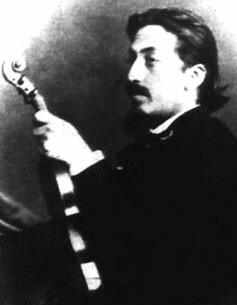Isaak Stern plays Wieniawski-Violin Concerto No. 2 in d minor op. 22
Isaac Stern: violin-Philadelphia Orchestra–Eugene Ormandy: conductor-1957
***************************************************************
From Wikipedia, the free encyclopedia

English: Henryk Wieniawski (10 July 1835 – 31 March 1880) was a Polish composer and violinist. (Photo credit: Wikipedia)
Violin Concerto No. 2 in D minor, Op. 22, by the Polish violin virtuoso, Henryk Wieniawski, may have been started in 1856, but the first performance did not take place until November 27, 1862, when he played it in St. Petersburg with Anton Rubinstein conducting. It was published in 1879, inscribed to his dear friend Pablo de Sarasate.
The work is in three movements:
-
Allegro moderato in D minor/F major
-
Romance: Andante non troppo in B flat major
-
Allegro con fuoco – Allegro moderato (à la Zingara) in D minor/D major
Both main elements of the first movement, its sombre, restless first subject, and its lyrical pendant (begun by a solo horn) are discussed freely and subject to dazzling embellishments by the solo violin. This movement includes a demanding variety of technique, including chromatic glissandi, double stops, arpeggios, sixths, octaves, thirds, chromatic scales, and artificial harmonics, not to mention a myriad of bowing techniques. The beat is based on a 4/4 or common time. The first movement uses a half-sonata form where the orchestral coda after the exposition transitions into the second movement instead of a development section.
The slow movement, a Romance, follows without a break. It is based on a lilting tune in 12/8 time and rises to an impassioned central climax.
A rhapsodic passage marked Allegro con fuoco and mainly a solo cadenza, leads to the finale, a dashing rondo in the gypsy style, which quotes the first movement’s subsidiary theme in the course of its second and third episodes. The final movement implements a 2/4 time, which allows the violinists to emphasize certain notes in the beginning of some measures.
Wieniawski’s second Violin Concerto remains one of the greatest violin concertos of the Romantic era, memorable for its lush and moving melodies and harmonies.
Instrumentation
The concerto is scored for solo violin and an orchestra consisting of 2 flutes, 2 oboes, 2 clarinets, 2 bassoons, 2 horns, 2 trumpets, 3 trombones (alto, tenor and bass), timpani, and strings.
References
- Golding, Robin (1991). Wieniawski: Violin Concertos Nos. 1 & 2, Sarasate: Zigeunerweisen. Deutsche Grammophon GmbH, Hamburg, pp. 1-2.





















































































